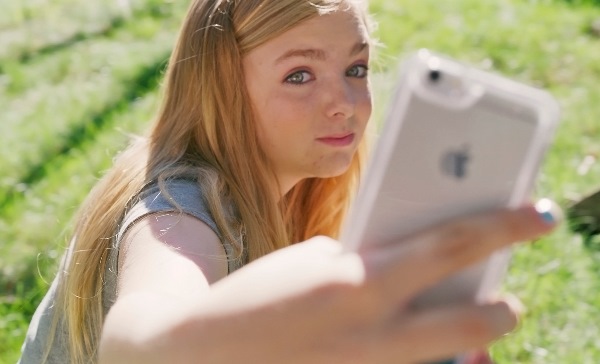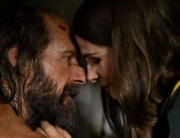![]() Penetrating, poignant, and often painful to watch, Eighth Grade is one of the smarter American coming-of-age films of late.
Penetrating, poignant, and often painful to watch, Eighth Grade is one of the smarter American coming-of-age films of late.
The world, and the movie, revolves around Kayla (a very good Elsie Fisher), who skirts and flirts with disaster on social media, the judgmental in-crowd, and a manipulative older boy with a one-track mind, but the film’s strength relies on her every day, ordinary interactions and run-of-the-mill suburban life. Apparently, mall culture is alive and well.
The tone is observational but because of Fisher’s heart-on-her-sleeve performance, not at all detached. The stakes are high for the 14-year-old, dirty-blond, moonfaced eighth grader; her desperation seeps through the pixels of her self-help YouTube videos. In her five-minute pieces, she urges viewers to be themselves, yet her clips follow a template that can be found on thousands of YouTube channels: down-to-earth, unpolished spiels that are often as calculated as any corporate sales pitch. As though she’s part of the trendsetting vlogger culture, Kayla incongruously signs off with the catchphrase, “Gucci,” perhaps as a sign of aspiration; she is really more Old Navy than Italian high fashion.
She tries to follow her own advice by putting herself out there, squeezing herself into a bathing suit for the swimming pool/birthday party of mega-popular school socialite Kennedy (Catherine Oliviere), who, like the rest of her clique, flaunts a size-0 physique. (As Kayla says in a video, “You can’t be brave without being scared.”) Especially in this sequence, and elsewhere, the direction is sensitive. The reticent teen’s not an object of scorn or laughter.
Instead, the camera almost acts as her confessor, zeroing in on her every flinch, teary eye, or blemish. It’s still unusual to see a teenager with actual acne onscreen. Her complexion alone lends the film a credence that other teen-related films strive for, as well as, like, you know, uh, the dialogue, that, like the characters, you know, like, speak. This is the first feature film by actor (The Big Sick) and comedian Bo Burnham, who knows his way around social media, having gained widespread attention on YouTube. His early videos are technically less polished than Kayla’s, who has the advantage of Instagram’s filters, but are consistently more on point. Considering Burnham’s online presence, his film is irony and droll free. It’s startlingly sincere in comparison.
Instead of focusing on one problem or message, the screenplay takes Kayla throughout the middling or momentous milestones of her last week of middle school. Kayla has been raised by a single dad (Josh Hamilton), who, like the popular and self-involved Kennedy, rigidly fits into a type: the clueless but well-meaning, hip-to-be-square parent—a fodder figure for comic relief.
This is a much more hopeful and open-minded view of growing up compared to a recent outcrop of dystopian teenage warnings from Europe that have featured social media as a mainly sinister presence and where physical or sexual abuse is a rite of passage, such as Eva Husson’s Bang Gang (A Modern Love Story) or the nightmare from the Netherlands, Find This Dumb Little Bitch and Throw Her in a River. The latter’s title says everything about that disturbing though riveting film’s tone.
Instead, Burnham captures a series of small victories and a few stumbles. Even though it has its darker moments, such as the drill where the entire school acts out a mass shooting in the hallways, it’s nothing like the continuous pie-in-the-face humiliations of Todd Solondz’s Welcome to the Dollhouse. It’s frank, but clutching of the pearls is not necessary.
The film also succeeds in convincingly portraying Kayla’s point of view while also undermining it. If told as a YA novel, her story would likely have been told in the form of a first-person narrative where readers would only see Kayla’s unfiltered perspective of herself. Here Kayla’s unpolished videos, with zero views, serve as the unreliable narrator. Also the camera catches the flipside to her behavior, mainly her grouchy reactions toward her dad at the dinner table, where she bristles at any and every attempt of his to interact. She tosses aside every compliment and tunes him out to listen to music.
Burnham has crafted a mostly quiet, pensive film, with the occasional blasting of the bass on the soundtrack whenever Kayla sees her crush, Aiden (Luke Prael). Despite the boy drama, it’s the approval of girls, and not boys, that’s paramount. Though smart phones are ever-present, there’s an old-fashioned feel to the story line: Kayla made a time capsule before she entered middle school, a gift to her future self as an eighth grade graduate. She now bases her self-esteem on the goals that she had set out for herself years earlier, measured by the number of Facebook and Instagram followers: she just wants to be liked.
Despite the technology, the episodic movie depicts timeless issues that are recognizable from generation to another. Burnham isn’t reinventing the wheel here but offering a vulnerable, contradictory, and caricature-free portrait. Kayla may not stand in for every teen, but she comes close.







Leave A Comment